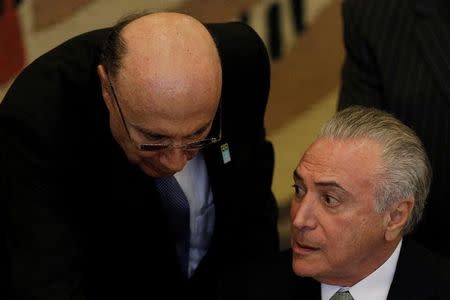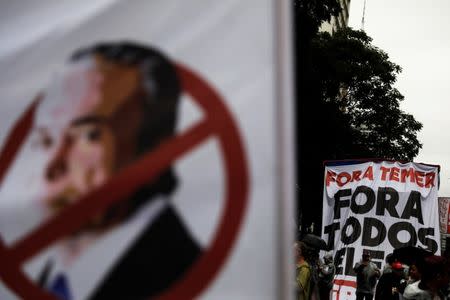No clear contender to replace Brazil's embattled Temer
By Alonso Soto BRASILIA (Reuters) - Key members of Brazil's coalition government are struggling to find a consensus candidate to replace President Michel Temer should he be forced from office by a massive corruption probe that has ensnared scores of politicians and business leaders. Temer, a centre-right politician, has refused to resign despite allegations he gave his blessing to a bribery scheme, but many allies say privately he has lost the ability to govern Latin America's largest economy and push pro-business policies through Congress. Some experts say government-backed measures to liberalize the labour market and raise the pension age have little chance of being passed until a new government is installed after fresh elections. Temer, who took over from leftist Dilma Rousseff after her 2016 impeachment for breaking budget rules, had been expected to serve through the end of 2018. If he left office early, Congress would appoint a new president to finish the term. Finance Minister Henrique Meirelles and a former president, Fernando Henrique Cardoso, are among the names floated as possible successors. Senator Tasso Jereissati, the interim head of the centre-right Brazilian Social Democracy Party (PSDB), and Rodrigo Maia, the leader of Brazil's lower house of Congress, also have been mentioned. But most of the politicians with the clout to help stabilize the nation, mired in its worst recession on record, also are under investigation in the "Operation Car Wash" graft probe or have been linked to companies that paid bribes, lawmakers said. "You need someone that can pacify the country and open a dialogue with all parties. We don't have anyone like that in Congress," said a senior lawmaker with the Democrats, a party that is in Temer's coalition. The lawmaker, who asked for anonymity to speak freely, said political leaders are far from reaching consensus on who would replace Temer. A disorganized transition poses the risk of a power vacuum that could harm an economy expected to emerge from recession this year. The Supreme Court last week approved an investigation into Temer based on testimony in a plea-bargain deal struck with executives at JBS SA, the world's biggest meatpacker. The businessmen admitted to paying tens of millions of dollars in bribes to nearly 1,900 politicians in recent years. Financial markets have bet heavily that Temer's government could pass austerity policies seen as needed to curb a fiscal deficit of more than 10 percent of gross domestic product (GDP). The measures are largely unpopular with Brazilians. "It will be very difficult for these reforms to be approved now," said Carlos Melo, a political scientist with Insper, a Sao Paulo business school. "Only a new government elected in 2018 will have the legitimacy to get these measures on track." Brazil's stock market fell 9 percent last week after the bribery allegations involving Temer surfaced, its biggest one-day loss since the 2007-2009 global financial crisis. Brazil's currency also sank, though it has since pared some losses. Among the evidence released by the Supreme Court was a secretly recorded conversation between Temer and Joesley Batista, the billionaire owner of JBS, in which Temer appeared to give his blessing to buying the silence of a potential witness in Operation Car Wash. 'SENSATIONAL' OPTION Meirelles, a favourite of investors who took over the finance ministry last year and headed the central bank under Brazil's leftist former president, Luiz Inacio Lula da Silva, is seen as a prime contender to replace Temer. But he was also briefly the chairman of the holding company that controls JBS and had advised the company on the setting up of its banking unit Banco Original. Meirelles has not been accused of any wrongdoing and has said he did not have a direct role in the JBS decisions. "Those connections make him a liability," said a leader with the PSDB, the country's third largest party, which is in Temer's coalition. "Meirelles can stay on as finance minister, but there is no chance he will president." Most coalition lawmakers and congressional aides contacted by Reuters agree that a new caretaker government should keep Meirelles' economic team in place to guarantee the continuity of policy. A member of the economic team told Reuters that he and most of his colleagues were willing to continue if Meirelles asked them to do so under a new administration. The PSDB leader, who asked for anonymity because his party has not yet decided to break with Temer, said Cardoso, who led Brazil from 1995 to 2003, could be a "sensational" option. Cardoso, a founding PSDB member credited with helping to stabilize the economy in the latter half of the 1990s, was also named in the corruption probe. He has denied any wrongdoing and expressed no interest in returning to front-line politics. The PSDB is also considering Jereissati, its interim president, the official said. Also under consideration is Maia, the lower house leader who would take over the presidency for a 30-day period in the event of Temer's ouster or resignation. Congress would pick a new president during that time. A supporter of the government's economic agenda, Maia is also under investigation by authorities for allegedly receiving bribes from Odebrecht, a builder at the heart of the corruption probe. He has denied any wrongdoing. Nelson Jobim, a former defence and justice minister who previously served on the Supreme court, also has been talked about as a possible successor to Temer. Jobim, a member of Temer's Brazilian Democratic Movement Party, is a partner and board member of BTG Pactual, an investment bank whose founder was briefly arrested in 2015 in connection with a corruption probe. (Reporting by Alonso Soto; Additional reporting by Anthony Boadle; Editing by Brad Brooks, Daniel Flynn and Paul Simao)

 Yahoo News
Yahoo News 
